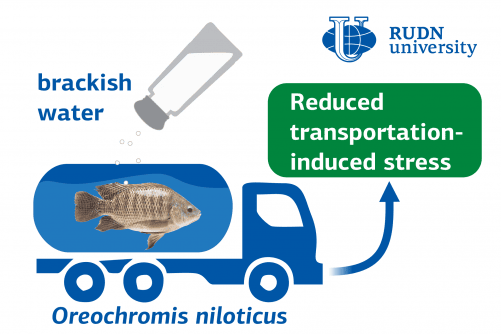
The study concludes that the addition of 4 g/L of salt to transport water reduces stress, liver damage and oxidative stress, and hydromineral imbalance in Nile tilapia.
Biologists from the Peoples’ Friendship University of Russia (RUDN University), the Iranian Fisheries Sciences Research Institute, the Federal Institute of Education, Science and Technology Catarinense, and the Gorgan University of Agricultural Sciences and Natural Resources evaluated the effects of different concentrations of salt (0, 2 and 4 g/L) added in the transport water on stress and antioxidant parameters of Nile tilapia (Oreochromis niloticus), after 3 h of transport.
Fish transport
Fish transport is an extremely stressful but unavoidable event in aquaculture.
Fish transport is associated with drawbacks such as stress, hydromineral imbalance, and oxidative stress. Therefore, it is worth finding methods to improve the health and welfare of fish during transport.
Regarding the mitigation of stress during transport, several studies evaluated the supplementation of diets with probiotics, turmeric, glycine, anesthetics, or the addition of salt to the water.
Various studies have reported that adding salt to fish transport water decreases osmotic stress and energy expenditure.
Previous studies regarding the application of salt in transport water have revealed that 1 and 2 g/L of salt decrease bacterial load, and 4 and 8 g/L of salt increase survival in the transport of Nile tilapia.
However, there are no data on the benefits of salt on stress, hydromineral balance, and antioxidant capacity in Nile tilapia.
Effect of salt on water quality
One of the bottlenecks in the transport of fish is the deterioration of water quality which is dangerous for fish. The stress caused by transport increases the metabolic rate; increased oxygen consumption and ammonia excretion.
Mitigation of stress during transport can subsidize the deterioration of water quality.
The researchers report that adding salt to the water did not bring benefits with respect to dissolved oxygen and ammonia levels in the water in the study.
Stress markers
Transport of fish induces stress, which results in the elevation of circulating cortisol. Elevated cortisol triggers gluconeogenesis to supply glucose as an energy source for cells, which is used to combat stress.
The addition of 2 or 4 g/L of salt to the water reduced cortisol and/or glucose elevations in the present study, suggesting a stress-relieving effect.
Likewise, the results of the study indicate that the addition of 4 g/L of salt to the water can reduce stress in Nile tilapia during transport.
Osmoregulation
Stressful conditions, such as transportation, increase the rate of metabolism; thus, the rate of gill ventilation increases to facilitate the mobilization of gases.
“The current results suggest that the addition of salt to the water may reduce osmotic disturbance in fish, which is likely due to the lower osmotic gradient between the fish body and the surrounding water,” they reported.
Liver health and antioxidant parameters
Antioxidant enzymes and non-enzymatic antioxidants protect cells from the adverse effects of oxidative stress produced by excess reactive oxygen species and are often increased after a stressful event.
In general, the antioxidant parameters show that the addition of salt to the water can reduce the oxidative condition during fish transport.
“The addition of salt to the water (particularly 4 g/L) can suppress the negative effects of transport-induced oxidative conditions in fish liver tissue. Less oxidative conditions lead to greater liver cell integrity and higher hepatic ALT and AST concentrations,” they report.
Conclusion
“The representative results indicated that adding salt to the water has benefits for the transport of Nile tilapia. Fish transported in brackish water present a lower degree of stress, less liver damage, less hepatic oxidative stress, and better hydromineral balance, although there is no benefit in regarding the quality of the water” they conclude.
According to the results of the study, 4 g/L of salt is beneficial in the transport of Nile tilapia.
The study was funded by the RUDN University Strategic Academic Leadership Program.
Reference (open access)
Yousefi, M., Hoseini, S. M., Weber, R. A., da Silva, E., Rajabiesterabadi, H., Arghideh, M., & Delavar, F. H. (2022). Alleviation of transportation-induced stress in Nile tilapia, Oreochromis niloticus, using brackish water. Aquaculture Reports, 27, 101378. https://doi.org/10.1016/j.aqrep.2022.101378
Editor at the digital magazine AquaHoy. He holds a degree in Aquaculture Biology from the National University of Santa (UNS) and a Master’s degree in Science and Innovation Management from the Polytechnic University of Valencia, with postgraduate diplomas in Business Innovation and Innovation Management. He possesses extensive experience in the aquaculture and fisheries sector, having led the Fisheries Innovation Unit of the National Program for Innovation in Fisheries and Aquaculture (PNIPA). He has served as a senior consultant in technology watch, an innovation project formulator and advisor, and a lecturer at UNS. He is a member of the Peruvian College of Biologists and was recognized by the World Aquaculture Society (WAS) in 2016 for his contribution to aquaculture.
